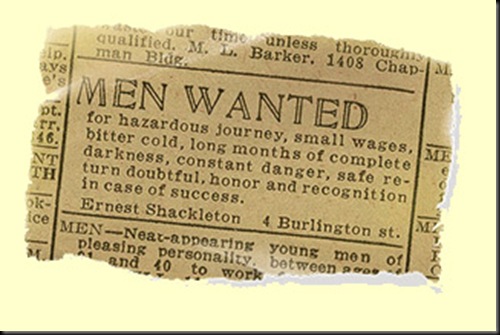Having said something about how entrepreneurial leaders are shameless connectors and voracious learners, I want to add something about their flexibility and their attitude to disappointment and failure.
My interviewees said that having a game plan was important, and this connects well with the surprisingly substantial emphasis on leadership and management skills in the entrepreneurial leadership literature (because entrepreneurial ventures have to actually get set up and work). But what is significant is that the game plan keeps on changing – “the business plan had to keep being reassessed”, “things changed and developed all the time”, “live with the tension of being really practical and being in flux …it’s a kind of design process. Do your research, do a bit of a prototype, and learn from it”. This fits with the concept of bricolage, mentioned last time.
Connected to this is the need to experiment. Say to yourself, “this might not work, but we’ll give it a go, because the learning you will get from that is enormous”. The advice I received was to “think about trial and error”. One person said “I have to have the courage to try things and see what works”, and another said “we had this idea of ‘why don’t we just try it?’ We didn’t know if it was going to work or not, so why don’t we just see?”.
Of course, if you’re going to experiment, and try things and see what happens, then you have to be prepared for the fact that what you do just might not work. In fact, it probably won’t! Four out of five entrepreneurial ventures fail in their first 5 years. Without a willingness to risk failure, you probably won’t even bother getting started. You have to recognise that failure is an option. As one interviewee commented, “the first year was a total failure, due to the global financial crash”, adding “so now we’re not frightened of failure. We don’t want to fail, but it is an option”. Not that this is always easy to live with, as another commented; “every one of us has nagging doubts, of “are you really sure? Are you really sure?”. But, as a further interviewee noted, “the church could do well at learning better from failure. We need to admit failure all around – the failure of the existing as well as the failure of the new”.
Of course, one can always take away something positive, by learning from difficulties and mistakes. One person commented, “you always come back stronger than what you were before, because you learn from your mistakes, because that’s the way humans are”. Another added, “I have learned how much past (negative) experiences are used for now”. People spoke of initiatives that “outlived their usefulness”, of volunteers who were “an absolute nightmare, I wanted to fire the lot of them”, and of the difficulties for some entrepreneurs who created an environment where “nobody challenges you because you’ve got them so sold on your vision”, but who now recognises that for the mistake it was.
What came across from a number of interviewees was the need to learn from and redefine failure and disappointment. Perhaps it is helpful to remember Rudyard Kipling’s “two imposters”. As one person noted, “success and failure is an illusion”. Another commented, “we saw fruit in everything we did. It was less fruit than we wanted … so that when it finished, it would have been very easy to say it failed. But none of us have said that”. Our definitions of success and failure are not only problematic, but “we’ll hold up models of people or projects that we define as success, and other things which have failed, and it’s a very fine line”. This fine line between so-called success and so-called failure is intrinsic to any entrepreneurial venture, as any person who is running one will admit. It doesn’t seem as though it would take much for the whole house of cards to come crashing down. As Leitch and Volery note, “the launch of a business venture is an ‘enacted’ phenomenon and constitutes a form of constructed reality characterised by equivocality, risk and uncertainty” (2016, p148)[1]. Both Icarus and the Wizard of Oz feel like role models for those who lead entrepreneurial ventures. Risk, uncertainty, disappointment and failure – what could possibly go wrong?
[1] CM Leitch and T Volery (2016), “Entrepreneurial Leadership: Insights and Directions”, in International Small Business Journal, Vol 35 No2, pp147-156
